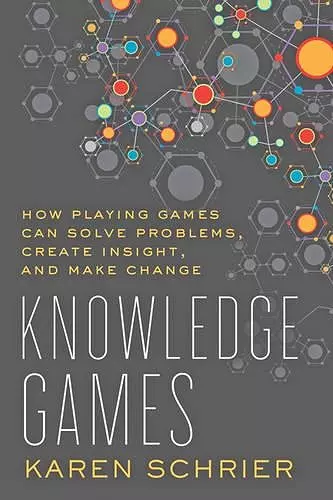Knowledge Games
How Playing Games Can Solve Problems, Create Insight, and Make Change
Format:Hardback
Publisher:Johns Hopkins University Press
Published:28th Jun '16
Currently unavailable, and unfortunately no date known when it will be back

By examining the intersection of crowdsourcing and games, Schrier provides a novel perspective on the role of games in society. This innovative book will resonate with students and scholars interested in game studies, computer science, and education. -- Zoe B. Corwin, University of Southern California, coeditor of Postsecondary Play: The Role of Games and Social Media in Higher Education Amidst all the many recent books on games, Karen Schrier's Knowledge Games is something really new and truly important. Knowledge games are games where everyday people, without degrees or credentials, contribute to science, make knowledge, and sometimes best the experts. It's all part of the larger Maker Movement and the drive for collective intelligence. -- James Paul Gee, Arizona State University, author of What Video Games Have to Teach Us about Learning and Literacy This book cuts through the thick fog of hype that surrounds games as learning tools in universities, businesses, and foundations. In place of blinkered ludophilia, Schrier offers a useful new category for thinking about games as machines by whose means we can do the work that produces new knowledge. -- Ian Bogost, Georgia Institute of Technology, author of How to Talk about Videogames Karen Schrier is thorough and clear in thinking through the interlacing issues involved with knowledge games. This book provides an important and critical overview of their development and experience. -- Drew Davidson, Carnegie Mellon University, editor of Beyond Fun: Serious Games and Media
This accessible book critiques the limits and implications of games and considers how they may redefine what it means to produce knowledge, to play, to educate, and to be a citizen.Imagine if new knowledge and insights came not just from research centers, think tanks, and universities but also from games, of all things. Video games have been viewed as causing social problems, but what if they actually helped solve them? This question drives Karen Schrier's Knowledge Games, which seeks to uncover the potentials and pitfalls of using games to make discoveries, solve real-world problems, and better understand our world. For example, so-called knowledge games-such as Foldit, a protein-folding puzzle game, SchoolLife, which crowdsources bullying interventions, and Reverse the Odds, in which mobile game players analyze breast cancer data-are already being used by researchers to gain scientific, psychological, and humanistic insights. Schrier argues that knowledge games are potentially powerful because of their ability to motivate a crowd of problem solvers within a dynamic system while also tapping into the innovative data processing and computational abilities of games. In the near future, Schrier asserts, knowledge games may be created to understand and predict voting behavior, climate concerns, historical perspectives, online harassment, susceptibility to depression, or optimal advertising strategies, among other things. In addition to investigating the intersection of games, problem solving, and crowdsourcing, Schrier examines what happens when knowledge emerges from games and game players rather than scientists, professionals, and researchers. This accessible book also critiques the limits and implications of games and considers how they may redefine what it means to produce knowledge, to play, to educate, and to be a citizen.
This book is accessible on many levels and creates opportunities for game players, game designers and game scholars to understand their own knowledge-building processes when working with games. Times Higher Education ... a substantial literature review of the vast - and rapidly growing - field of games that contribute to knowledge production. Reflective Teaching ... Knowledge Games serves as our entry point into a new conversation about the potential-and soon to be reality-of video games. elearn Magazine ... Schrier does a great job of clearing a space where we can chat about games' potential for giving us new perspectives on old problems. NEW SCIENTIST
ISBN: 9781421419206
Dimensions: 229mm x 152mm x 25mm
Weight: 522g
280 pages